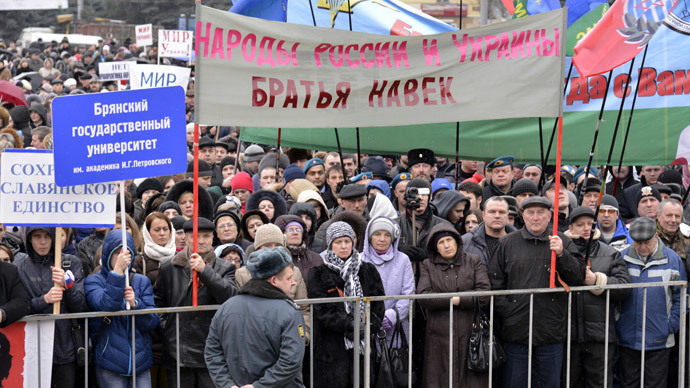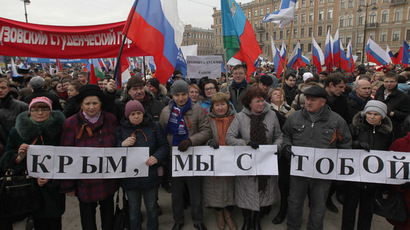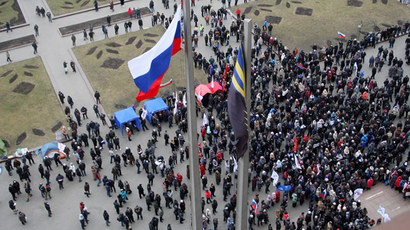Thousands rally in Russia’s southwest to support Russian speakers in Ukraine

Thousands gathered in the Russian cities of Novocherkassk, Bryansk, and Belgorod to support the Russian-speaking population in Ukraine. “We don’t abandon our people,” said banners held by those who sympathized with residents of the crisis-torn country.
Nearly 7,500 people took part in a demonstration in the southern
city of Novocherkassk, one of the biggest industrial centers of
Rostov region and capital of the Cossacks.
People from the entire Rostov region gathered in the center of
the city, carrying Russian flags and wearing black and orange
ribbons – a Russian symbol of the victory in World War II. The
demonstrators held banners saying, “No to extremism,”
and “Peace for Ukraine,” along with “Russia and
Ukraine: the same roots, the same faith.”
What is currently happening in Ukraine can hardly be called
“democratic reorganizations,” said Anatoly Nosyrev,
world champion in kickboxing and Novocherkassk resident.
Rallies in the southern city of Bryansk, a center of steel and
manufacturing, attracted over 5,000 people, local police told
ITAR-TASS.
Among those present to support Ukraine were World War II
veterans, activists of public organizations, students, and
teachers.
“I sympathize with Ukrainian people, especially with the
citizens of Crimea and Sevastopol,” said Vitaly Volvich, a
citizen of Bryansk.
The rally, held under the slogan, 'We don’t abandon our people,'
started in the city’s center square.
“By this demonstration, we give hope to all the citizens of
Crimea that Russia doesn’t abandon them. We are ready to help
them,” said Igor Dorokhov, a former officer who served in
Ukraine.

Some of the city's deputies also called upon the local people to support the rally, which was deemed a "popular gathering for brotherly people."
“The nationalism is raising in the Western parts of Ukraine,” said Nikolay Dashunin, the head of administration of one of Bryansk’s districts. “We gathered here to support Russian-speaking citizens of Crimea and Ukraine in general.”
Rallies and other actions in support of the Russian-speaking population of Ukraine also attracted nearly 5,000 people in the southern city of Belgorod, the capital of the region which borders Ukraine.
The future of Ukraine should be determined by its citizens, not separate radicals, said the participants of the rally.
Митинг в поддержку Украины в #Белгород'е pic.twitter.com/AWadVUnk6p
— Корнев (@che0cafe) March 3, 2014
“Now it is very important to let Ukrainian nation make its
own decisions,” said Viktor Ovchinnikov, deputy head of
Public Chamber of the Belgorod Region, adding that the Ukrainian
people should feel the support of Russians.
Only 80 kilometers separate Belgorod from its neighbor, the
eastern Ukrainian city of Kharkov. During World War II, their
citizens fought against Nazi invasion together under the flags of
the USSR.
“Veterans of both Belgorod and Kharkov have long life
traditions,” said city veterans. “We shouldn’t leave
them [people of Kharkov] in trouble.”
On Sunday, thousands in Moscow, St Petersburg, and the southern
city of Krasnodar rallied in support of the Russian-speaking
population of Ukraine. Around 27,000 people – including members
of patriotic youth groups and veterans’ organizations – took part
in the Moscow march, held under the slogan, 'We don’t abandon our
people.'

A demonstration in St. Petersburg attracted some 15,000 people. The rally was organized as a gesture of approval of the decision of the Russian government, which allowed the use of Russian troops to protect Russian citizens and ethnic Russians living in Ukraine from possible violence.
Authorities in Crimea requested Moscow’s assistance after the new self-proclaimed government in Kiev introduced a law abolishing the use of languages other than Ukrainian in official circumstances.
Facts you need to know about Crimea and why it is in turmoil
Feeling a threat from the self-appointed government, a number of regions have stood up against it. Thousands of people across eastern and southern Ukraine are flooding the streets of major cities, urging local authorities to disobey Kiev’s orders. The local population has deemed the government in Kiev illegitimate, demanding that their local governments refuse to take orders from it.














